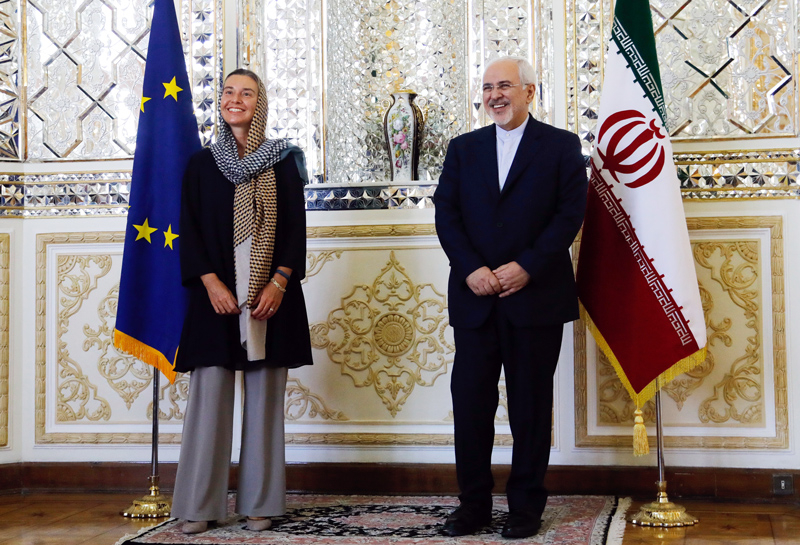 It is incumbent upon the European Union to stop softening its tone toward the Islamic Republic, and instead join the Trump administration in imposing maximum pressure on the ruling mullahs of Iran. The more the EU appeases the Iranian government, the more it empowers it to pursue aggressive and terrorist activities. Pictured: The EU's then High Representative for Foreign Affairs and Security, Federica Mogherini (left), laughs with Iranian Foreign Minister Javad Zarif, during her August 2017 visit to Iran. (Image source: European External Action Service/Flickr) |
The European Union really needs to do two things as soon as possible: stop criticizing the Trump administration for its Iran policy, and halt its appeasement policies toward the ruling mullahs of Iran who have committed some of the worst crimes against humanity, not only in Iran but abroad.
On January 19, 2020, British Prime Minister Boris Johnson and French President Emmanuel Macron reiterated their commitment to keep Iran nuclear deal alive. Europe has been working to implement a special purpose vehicle that will allow countries to continue trading with Iran, despite US sanctions, known as INSTEX.
Most recently, many innocent citizens of Canada, Iran and the EU were killed when an Iranian missile downed a Ukrainian passenger plane. The Iranian leaders first attempted to mislead the international community, veil the truth, and deny any involvement in the strike. The Iranian government also rejected cooperating with international investigators. "We will not give the black box to the manufacturer [Boeing] or America," said Ali Abedzadeh, the head of Iran's Civil Aviation Authority.
The killing of 176 innocent people -- albeit accidental, and the attempted cover-up, not accidental -- reveals that Iran's theocratic establishment prioritizes military adventurism over human life. After the passenger plane was shot down and 176 people lost their lives, Iranian leaders praised their "successful" military operation. Former IRGC commander-in-chief Mohsen Rezaei appeared on Iran's Channel 3 and offered his congratulations to the IRGC's missile attack:
"I extend my congratulation (sic) for taking harsh revenge to the Leadership [Khamenei] and the novel nation who 'suffered' from Soleimani's [death]. This operation was, in fact, the bombardment of both the authority and prestige of the United States."
When the regime rushed to conceal evidence after shooting down the European plane, CBS News correspondent Elizabeth Palmer tweeted:
"CBS crew just visited the #Ukrainian airlines crash site west of Tehran. Nine am local time. Virtually all pieces of the plane were removed yesterday - say locals. Scavengers now picking site clean. No security. Not cordoned off. No sign of any investigators."
After Tehran, however, was faced with overwhelming evidence, including credible intelligence reports from several governments as well as a video showing that the plane was hit over Tehran, the Islamic Republic was forced to admit that it had shot down the passenger plane.
The IRGC's shooting down of the passenger plane has sparked anger and fury inside Iran and abroad. Iranians took to the street protesting the regime and demanding that Supreme Leader Ayatollah Ali Khamenei resign.
In the first demonstration against the ruling mullahs since the death of the Iranian General Qassem Soleiman, people can be heard chanting in front of Tehran's Amir Kabir University: "Commander-in-chief [Khamenei] resign, resign", "Death to the liars" and "Death to Khamenei!"
People have also been criticizing the regime for its belated admission and attempts to conceal the truth. Hesham Ghanbari, 27, a university student in Tehran told Reuters:
"Why should I vote for this regime. I don't trust them at all. They lied to us about the plane crash. Why should I trust them when they don't trust people enough to tell the truth?"
The regime, in turn, is resorting to its usual modus operandi of cracking down on the protesters with savage force.
Many of the Iranian people are familiar with the regime's careless or willful killing of innocent people. According to Amnesty International, hundreds of people were killed two months ago by the regime forces when people demonstrated against a hike in gas prices.
The Iranian government has also been implicated in a series of assassination and terrorist plots across Europe, some successful others not, but all have been traced back to Tehran. European officials also foiled a terrorist attack that targeted a large "Free Iran" convention in Paris, attended in June 2018 by many high-level speakers -- including former US House of Representatives Speaker Newt Gingrich, former New York City mayor Rudy Giuliani, and former Canadian Foreign Minister John Baird.
Iran's attacks were also evident in 2018 in Denmark, where officials accused Tehran of attempting to assassinate one of its citizens. Foreign Minister Anders Samuelsen emphasized the seriousness of the plot:
"An Iranian intelligence agency has planned an assassination on Danish soil. This is completely unacceptable. In fact, the gravity of the matter is difficult to describe. That has been made crystal clear to the Iranian ambassador in Copenhagen today."
It is worth noting that, the EU did announce a positive step. In light of the revelations concerning Iran's assassinations plots, minor sanctions were imposed on sectors of the Iranian Ministry of Intelligence, as well as on Saeid Hashemi Moghadan, the deputy intelligence minister.
However, these do not go nearly far enough, particularly if the EU is inclined to continue its support for the JCPOA.
It is incumbent upon the EU to stop softening its tone toward the Islamic Republic, and instead join the Trump administration in imposing maximum pressure on the ruling mullahs of Iran. The more the EU appeases the Iranian government, the more it empowers it to pursue aggressive and terrorist activities.
Dr. Majid Rafizadeh is a business strategist and advisor, Harvard-educated scholar, political scientist, board member of Harvard International Review, and president of the International American Council on the Middle East. He has authored several books on Islam and US foreign policy. He can be reached at Dr.Rafizadeh@Post.Harvard.Edu


